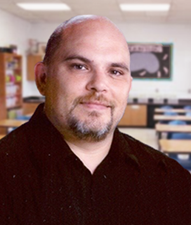An Outdoorsman in the Classroom
Angela Chambers |
March 18, 2019

 Every time there’s a heavy rain, floating trash islands wash into Jackson Lake in Clayton County, Georgia. Only a few miles away is Mount Zion High School, where teacher Charles Battles uses the unfortunate mess to illustrate a bigger challenge.
Every time there’s a heavy rain, floating trash islands wash into Jackson Lake in Clayton County, Georgia. Only a few miles away is Mount Zion High School, where teacher Charles Battles uses the unfortunate mess to illustrate a bigger challenge.
While the giant garbage patch in the Pacific Ocean can seem distant and intangible, bringing this big problem to a local scale makes it more relatable and meaningful for students in his Advanced Placement® Environmental Science course.
From saving sea turtles to swimming with whale sharks, Battles loves nature and spending time outdoors. This passion made his first school year teaching AP® Environmental Science an easy transition from his previous post in AP Physics.
 “I’m a conservationist at heart, so the class allowed me to bring in some of my hobbies to share with the kids,” says Battles, NMSI’s March Teacher of the Month.
“I’m a conservationist at heart, so the class allowed me to bring in some of my hobbies to share with the kids,” says Battles, NMSI’s March Teacher of the Month.
At home, the teacher collects interesting wildlife to bring into class. Recently, he showed his students an owl butterfly, which has large eyespots on its wings that resemble an owl’s eyes. “I was blown away by how mesmerized my students were by this bug,” Battles says.
Mount Zion is in Jonesboro, which is part of the greater Atlanta area. Living in an urban environment, Battles says his students don’t have as many opportunities to explore nature. By bringing things he finds outdoors to school, the teacher allows his students to “touch it, feel it, see it – make it real.”
NMSI Network
Another way Battles applies this hands-on approach is by using ideas from NMSI trainings. For example, he used large hula hoops to create bubbles – each one representing the life of a human, animal or plant. The lesson taught students that some, like human children, receive a lot of support to survive, while others, like a plant seed blowing in the wind, survive by chance.
“The labs and suggestions from NMSI really helped associate what students are learning in books to reality,” Battles says.
Since he’s new to teaching environmental science, Battles appreciates the online NMSI curriculum and support. “When I started teaching about pollution, I reached out [to NMSI] and received a link within a half hour,” he says. “I truly believe the success I’ve had is due greatly to the NMSI mentorship.”
Expanding on the initial support from NMSI, the teacher brought the problem of pollution to life by asking students to weigh empty water bottles. While many may think buying expensive water is better, the cheapest water is typically contained in the lightest bottles that use the least amount of plastic, which is ultimately better for the environment. By thinking about making small changes in habits, such as using a water filter at home or finding a place to recycle water bottles, Battles helps students learn about their ecological footprints.
“We’re planting the seeds for kids to remember and be better environmentalists on their own as they become adults,” Battles says. “It’s really the only way we’re going to save the environment.”
Accessible Science
While he’s spent most of his 19-year career at Mount Zion teaching physics, the teacher believes environmental science is a more approachable STEM course than physics. By taking environmental science first, Battles says some students will then feel comfortable with trying another scientific course.
“Some of our lowest-performing students have had the opportunity to demonstrate that they are capable of performing well in science,” says Dione Griffin, Mount Zion Title I Academic Coach. “These students truly enjoy working with Mr. Battles and have expressed that they have had opportunities to explore science in ways that they have never experienced before.”
Thanks to his success, Battles was selected to pilot a partnership between Clayton County Public Schools and Last Chance Endeavors, which works with public schools to monitor wildlife and connect students with efforts to save the planet. Battles will use the partnership to develop curriculum to implement next year. The opportunity allows students to “participate in real world inquiry and data collection,” Griffin shares.
Know a NMSI-connected teacher who deserves recognition? Email marketing@nms.org to tell us what they are doing to a make real differences in math, science and English education for their students.